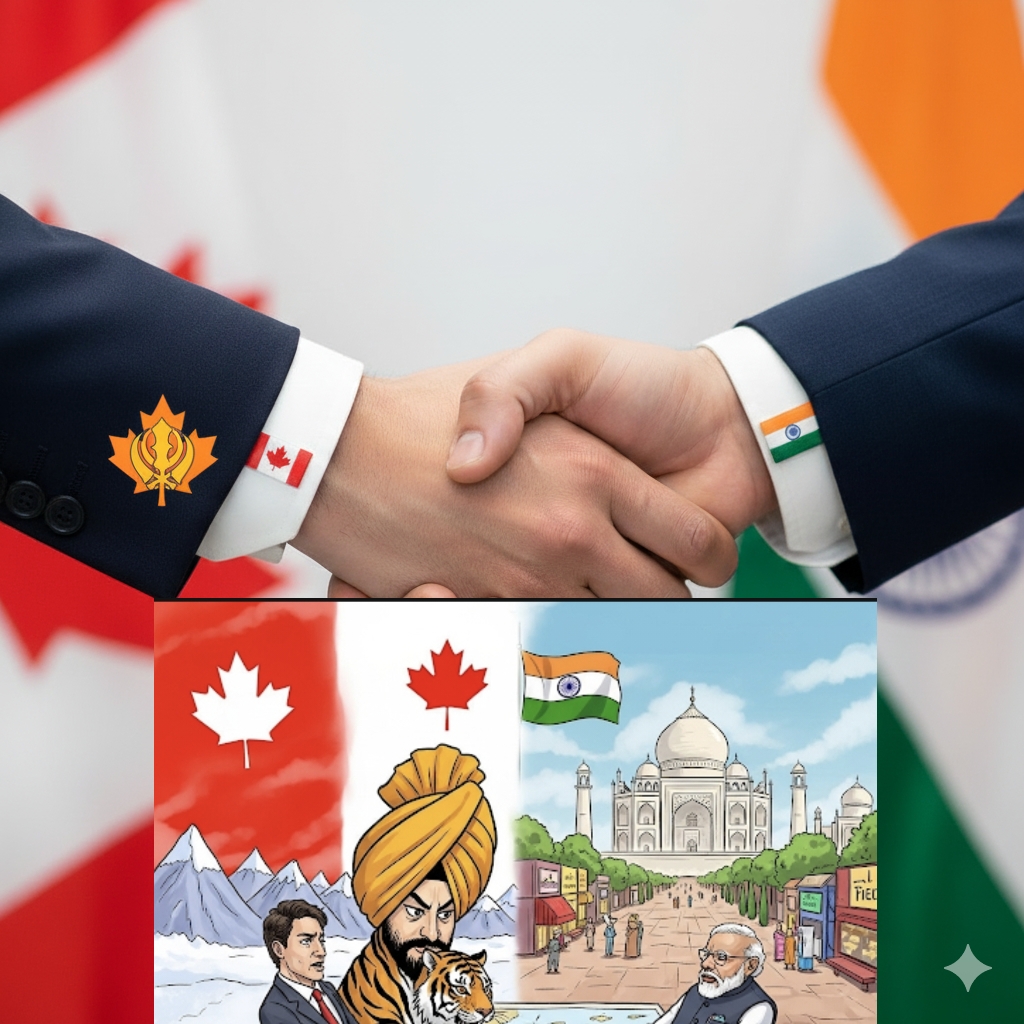Sikh Advocacy Group Proclaims Intent to Occupy Diplomatic Premises Amid Diplomatic Resumption
In a surprising escalation of tensions between Canada and India, the Khalistani separatist group Sikhs for Justice (SFJ) has announced plans to “siege” the Indian Consulate in Vancouver. This provocative move comes at a time when diplomatic relations between the two nations are in the process of being restored. The SFJ has designated Thursday for the planned occupation, urging Indo-Canadian individuals who had intended to visit the consulate for regular business to reconsider their plans.
The group substantiated its bold announcement by releasing a poster that depicted the new Indian High Commissioner to Canada, Dinish Patnaik, with a target drawn on his face. The SFJ’s statement was laced with serious allegations, accusing Indian consulates of orchestrating a spy network aimed at surveilling Khalistani activists. This assertion echoes previous warnings made by Prime Minister Justin Trudeau, who, two years ago on September 18, stated in Parliament that investigations were underway concerning the involvement of Indian agents in the assassination of prominent Khalistani activist Hardeep Singh Nijjar.
As tensions mount, the SFJ expressed that the threat faced by its members is significant enough that the Royal Canadian Mounted Police (RCMP) had to offer “witness protection” to Inderjeet Singh Gosal. Gosal has stepped into a leadership role for the Khalistan Referendum campaign following Nijjar’s untimely death. The SFJ maintains that their planned siege aims to demand accountability for what they term “espionage and intimidation” occurring on Canadian soil.
The announcement has not gone unnoticed, though there has been no immediate response from either the Indian Ministry of External Affairs or the Indian Consulate in Vancouver at the time of this report. This silence may signal the complexities underlying the diplomatic relationship, which is still in delicate stages of recovery.
Khalistani Extremism: A Growing Concern in Canada
The growing presence of extremist Khalistani groups in Canada has raised alarms among Canadian authorities. An internal report released earlier this month acknowledged that these groups are not only active but also receive financial backing from individuals and networks based in the country. Among these organizations are Babbar Khalsa International and the International Sikh Youth Federation (ISYF), both of which are designated as terrorist entities under Canada’s Criminal Code.
These extremist factions, according to the report, have adapted over time to operate more discreetly. They now function through smaller, loose networks of individuals advocating for the Khalistan cause without direct ties to a formal organization. This shift has made it more challenging for authorities to address the issue effectively, leading to a growing concern about public safety and national security.
The Canadian government’s acknowledgment of this issue reflects a broader awareness of the challenges posed by radical ideologies that can sometimes find fertile ground in diaspora communities. With the backdrop of the recent diplomatic spat, the situation has taken on a heightened urgency, forcing both nations to navigate a turbulent landscape filled with historical grievances and contemporary political realities.
Canada’s Response to Khalistani Activities
The Canadian government has increasingly found itself in a complex position regarding Khalistani extremism. While it has extended support to the Sikh community and recognized their right to advocate for self-determination, it concurrently faces pressure to ensure that these activities do not foster violence or terrorism. The existence of organizations such as the SFJ, which operate in Canada while promoting separatism and radical action, complicates this balance.
Furthermore, the financial networks supporting these groups represent another significant challenge for Canadian authorities. Investigative efforts need to intensify toward understanding how funding flows to these organizations and whether they directly correlate with incidents of violence or intimidation. According to reports from credible sources, including organizations like the Canadian Security Intelligence Service (CSIS), there is a real concern that extremism could spill over into more direct forms of aggression against perceived enemies, including diplomatic missions like that of India.
According to the report by the BBC, various community leaders and political representatives have urged dialogue and constructive engagement as the most effective means to resolve the ongoing tensions and address the grievances of the Khalistani supporters without resorting to violence, which only exacerbates the situation.
What Lies Ahead
With the planned siege and the ongoing strain in Canada-India relations, the coming days will be crucial. The SFJ’s declared intent reflects a deeper, unresolved tension within the Sikh diaspora about identity, sovereignty, and the perception of Indian government actions overseas. The issue is far from simplistic, as it intertwines personal justice narratives, historical grievances, and modern geopolitical diplomacy.
As both communities grapple with these challenges, the response from Canadian authorities and their ability to effectively manage such situations will be under scrutiny. It will also highlight the need for comprehensive dialogues that extend beyond government officials to include community representatives. Addressing these concerns may provide a pathway to lowering tensions and fostering stronger, more constructive relationships between the two nations.
Broader Implications of the Khalistani Movement
The escalation of Khalistani rhetoric and action in Canada signifies potential future challenges, not just for diplomatic ties between Ottawa and New Delhi but also for the overall safety and cohesion of communities within Canada. As extremist narratives gain traction, they may threaten to divide communities along ideological lines, creating an environment where mistrust and conflict can flourish.
The nature of global geopolitics, particularly as nations respond to diaspora pressures and separatist sentiments, calls for a re-evaluation of how such groups are engaged in dialogue or addressed by the state. The overarching aim should be to avert violence while respecting the rights of individuals to voice their grievances.
In conclusion, the events unfolding around the Indian Consulate in Vancouver will likely resonate beyond immediate actions and reactions, shaping the broader discourse of how governments interact with diaspora communities and handle domestic extremism in the future.


